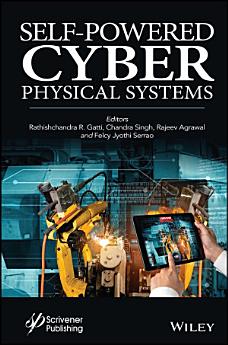Self-Powered Cyber Physical Systems
關於這本電子書
This cutting-edge new volume provides a comprehensive exploration of emerging technologies and trends in energy management, self-powered devices, and cyber-physical systems, offering valuable insights into the future of autonomous systems and addressing the urgent need for energy-efficient solutions in a world that is increasingly data-driven and sensor-rich.
This book is an attempt to aim at a very futuristic vision of achieving self-powered cyber-physical systems by applying a multitude of current technologies such as ULP electronics, thin film electronics, ULP transducers, autonomous wireless sensor networks using energy harvesters at the component level and energy efficient clean energy for powering data centers and machines at the system level. This is the need of the hour for cyber-physical systems since data requires energy when it is stored, transmitted, or converted to other forms. Cyber-physical systems will become energy hungry since the industry trend is towards ubiquitous computing with massive deployment of sensors and actuators. This is evident in using blockchain technologies such as Bitcoin or running epochs for artificial intelligence (AI) applications. Hence, there is a need for research to understand energy patterns and distribution in cyber-physical systems and adopt new technologies to transcend to self-powered cyber-physical systems. This book explores the recent trends in energy management, self-powered devices, and methods in the cyber-physical world.
Written and edited by a team of experts in the field, this book tackles a multitude of subjects related to cyber physical systems (CPSs), including self-powered sensory transducers, ambient energy harvesting for wireless sensor networks, actuator methods and non-contact sensing equipment for soft robots, alternative optimization strategies for DGDCs to improve task distribution and provider profits, wireless power transfer methods, machine learning algorithms for CPS and IoT applications, integration of renewables, electric vehicles (EVs), smart grids, RES micro-grid and EV systems for effective load matching, self-powered car cyber-physical systems, anonymous routing and intrusion detection systems for VANET security, data-driven pavement distress prediction methods, the impact of autonomous vehicles on industries and the auto insurance market, Intelligent transportation systems and associated security concerns, digital twin prototypes and their automotive applications, farming robotics for CPS farming, self-powered CPS in smart cities, self-powered CPS in healthcare and biomedical devices, cyber-security considerations, societal impact and ethical concerns, and advances in human-machine interfaces and explore the integration of self-powered CPS in industrial automation. Whether for the veteran engineer or student, this volume is a must-have for any library.
關於作者
Rathishchandra R Gatti, PhD, is a professor and head of the Department of Mechanical Engineering and Robotics and Automation at the Sahyadri College of Engineering and Management, Mangalore, India. He holds four patents, has published over 40 peer-reviewed publications and is the editor of seven books and one journal. He has over 20 years of R&D experience in mechanical engineering and mechatronics.
Chandra Singh, MTech, is an assistant professor in the Department of Electronics and Communication Engineering at the Sahyadri College of Engineering and Management, Mangalore, India and is pursuing his PhD. He holds four patents, has written over 25 peer-reviewed publications and is the editor of 7 books.
Rajeev Agrawal, PhD, is an associate professor in the Department of Mechanical Engineering, at the Malaviya National Institute of Technology, Jaipur, India. He has more than 24 years of professional experience and serves on the editorial board of three international journals and has guest-edited over 10 journals and books. He has published over 100 research papers.
Felcy Jyothi Serrao, PhD, is an associate professor in the Department of Physics at Sahyadri College of Engineering and Management, India. She has 19 years of teaching experience and 12 years of research experience in the field of semiconducting metal oxide nanofilms. She has published more than 18 research articles in peer-reviewed journals and conferences.






